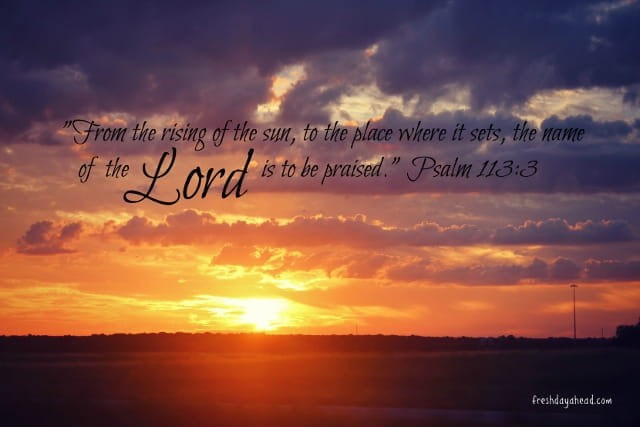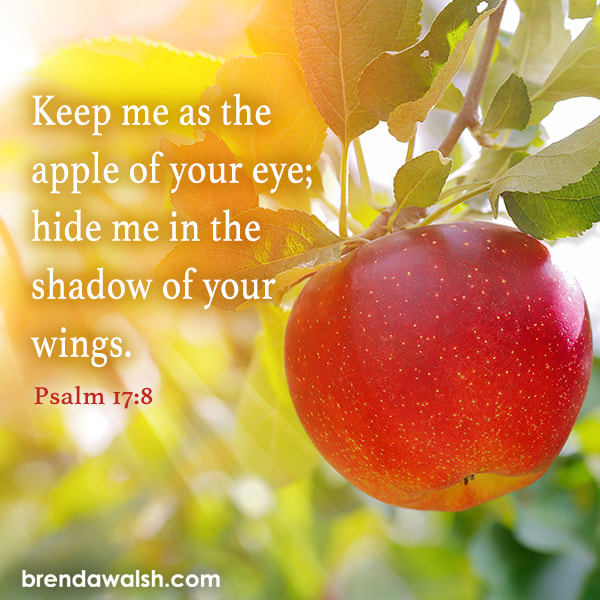“the apple of the eye.”
This ancient metaphor is a reference to the “pupil” of the eye, which is exactly how some Bible translations render it. Here are three Old Testament uses of the phrase the apple of the eye:
The wise father says to his son, “Keep my commands and you will live; guard my teachings as the apple of your eye” (Proverbs 7:2).
The psalmist prays, “Keep me as the apple of your eye; hide me in the shadow of your wings” (Psalm 17:8).
And in Deuteronomy 32:10 Moses relates a poetic description of God’s care for Israel: “In a desert land he found him, in a barren and howling waste. He shielded him and cared for him; he guarded him as the apple of his eye.”
At the risk of getting a little word-nerdy, let’s look at some of the Hebrew behind the phrase. The “apple” in the apple of the eye is a translation of the Hebrew word for “apple,” ishon, which is related to the word ish, meaning “man.” Etymologically, the ishon of the eye is “the little man of the eye.” Have you ever looked someone in the eye and seen your own reflection in their pupil? That’s the “little man,” right in the center of the eye.
The apple of one’s eye is a very sensitive place and therefore very protected. Think about your own eye for a moment. What happens if something flies in it or toward it? Your eyelids reflexively close, your head turns, and your hands position themselves to ward off the threat. Our eyesight is valuable, and our body naturally protects that vulnerable spot to prevent injury.
So, the instruction in Proverbs 7:2 is to hold godly wisdom in high regard as the valuable thing it is. The prayer in Psalm 17:8 is for God to keep guard over us as He would the pupil of His own eye. And the description of God’s care for His people in Deuteronomy 32:10 emphasizes Israel’s vulnerability and God’s tender, loving affection. God provided complete protection; His people were a priority. In the “howling wilderness,” God provided manna for them to eat, water from a rock, and safety from their enemies. His care was as automatic as if He were guarding the center of His eye from harm. What a loving God we serve.
God held the Israelites as the apple of His eye, rebellious and stiff-necked though they were in the wilderness. Being the apple of His eye, they were most cherished. And God’s care for His people has not diminished with time. He holds His children close, and He can protect us as easily as our eyelids protect our pupils. He does this because He loves us in Christ. He has a parental, protective love for us, and the biblical descriptions of His love are eye-opening, to say the least.
The importance of praising God
is mentioned hundreds of times in the Bible,
both in the Old Testament and the New Testament.
Praising God means telling or otherwise expressing how
wonderful and great we believe God is
and how much we love Him.
You might have heard the phrase before, possibly as an encouragement for active, expressive worship in church: “God inhabits the praise of His people.” It’s sometimes said as a way to inspire people to sing to the Lord, loud and proud.
But the phrase is confusing for many—what does it mean that God “inhabits” His people’s praise, and how should that impact my relationship with God and the way I approach worship?
What Does it Mean That
God Inhabits the Praise of His People?
The phrase, “God inhabits the praise of His people,” comes from the King James Version of Psalm 22:3, which states of God, “But thou art holy, O thou that inhabitest the praises of Israel.” Other translations say, “Yet you are enthroned as the Holy One; you are the one Israel praises” (NIV) or “God, you are the Holy One. You sit as King upon the praises of Israel” (ERV).
The actual Hebrew uses the word qadosh, an adjective for God that Strong’s Concordance says means holy or sacred, and the verb yashab, which means to sit, remain, or dwell. Yashab is the same word used in Genesis 4:20, where the Bible talks about a man named Jabal who is the father of those who dwell in—or inhabit, live within—tents and have livestock. “Praises” comes from the Hebrew tehillah, which means praise or song of praise.
Translations using the word “enthroned” or “sit” draw from the same concept—where a man would sit, as upon a king’s throne or at the place of honor at a table—is akin to a dwelling place, a place of rest. So then, the phrase means God inhabits—rests in, sits upon, dwells within—His people’s songs of worship and adoration.
The word “inhabits” is not suggesting God is only present when people are singing praises about Him. Obviously, God is not confined to one place. As the Creator of the universe, the world, and all the people and things within it, God has no bounds. But what the writer of the psalm seems to be saying is that God is present and glorified when His people lift His name in honor. God enjoys it—perhaps it brings Him peace and rest. He draws nearer to us when we praise Him.
What Is the Full Meaning of Psalm 22 and This Key Verse?Psalm 22 is thought to have been written by King David. It is a cry of anguish and interestingly parallels much of what happens in Jesus’s crucifixion, though it was written 1,000 years before those events would occur. History does not indicate David himself experienced any of the events in this psalm, yet it contains so many similarities to Christ Jesus, from His final words upon the cross and the piercing of His hands and feet to the enemies surrounding Him and the dividing of His clothing.
Much of this psalm of lament involves David, sorely distressed and feeling rejected by the Lord, remembering past times of rescue and imploring God for help. You are holy, and yet you feel so far away, David is saying to God in essence. But our ancestors praised you and trusted you, and you delivered them, so I will do the same. David is speaking confidently, certain God will hear his praises and deliver him despite that he is, as he says, “a worm and not a man” (verse 6).
The psalm is written to the “director of music” and set to the tune of “The Doe of the Morning.” It is meant to be sung, scholars believe, an art form David held in high regard as a way to lift the name of the Lord and honor Him. In this reminder that God does indeed “inhabit the praise of His people,” David is thought to be reminding Himself that He is to praise God in all circumstances, even when things seem hopeless.
How Can We Give Praise to God?
The importance of praising God is mentioned hundreds of times in the Bible, both in the Old Testament and the New Testament. Praising God means telling or otherwise expressing how wonderful and great we believe God is and how much we love Him. This can be done with words—such as through prayer, teaching, singing, painting, or writing—or other modes of expression, such as dance, painting a picture, or simply opening your heart to Him in love during a moment of quiet stillness. It can mean heeding God’s commands and knowing He is Lord, as well as obeying His commandments and understanding we are to follow His Son, our savior Jesus.
Hebrews gives us one way to look at praise, noting we should
"Continuously offer to God a sacrifice of praise--
the fruit of lips that
openly profess his name
(Hebrews 13:15).
There are several “praise psalms” throughout the Book of Psalms, and Psalm 145 is specifically introduced and identified as “a psalm of praise.” As it begins, “I will exalt you, my God the King; I will praise your name for ever and ever” (Psalm 145:1).
Praise does not have to be in song or even spoken.
We can praise God by bowing before Him or spending time in creation
acknowledging and remembering that
God created it all.
Some people walk a prayer labyrinth as a form of praise or jot notes in a journal. And praise is not confined to people, either. Psalm 148 tells us the sun, moon, and stars praise God (verse 3), as do the angels, sea creatures, flying birds, and ocean depths (v. 2, 7, 10).
Indeed, the psalms indicate anything intended to honor God is considered praise, even battles and vengeance against other nations (Psalm 149:6-9).
Is There a Difference Between Prayer and Praise?
Prayer and praise can be very similar.
It depends on the intention.
Prayer is always praise, for by going to God for help, we are acknowledging Him as sovereign—that in itself is praise. But prayer is also other things in addition: a request for help, a conversation with the Creator, an expression of gratitude, etc.
Why Is it Important to Give Praise to God (Even in Hard Times)?
We are always to praise God, in good times and bad.
In his letter to the early church in Thessalonica,
the apostle Paul reminds Christians to
"Rejoice always, pray continually, give thanks in all circumstances; for this is God’s will for you in Christ Jesus”
(1 Thessalonians 5:16-18).
The apostle Peter says,
"But you are a chosen people, a royal priesthood, a holy nation,
God’s special possession, that you may declare the praises of him who
called you out of darkness into his wonderful light”
(1 Peter 2:9).
Scripture tells us God hears us always and is with us always.
As Isaiah 65:24 says, “Before they call I will answer; while they are still speaking I will hear.”
And Jesus indicates God will not only hear
but help those faithful
who call upon him.
As He told the disciples in Matthew 21:21-22,
"Truly I tell you,
if you have faith and do not doubt,
not only can you do what was done to the
fig tree,
but also you can say to this mountain,
"Go, throw yourself into the sea,’ and it will be done.
If you believe, you will receive whatever you ask for in prayer.”
God gives us the breath of life,
enabling us to walk upon this earth.
Psalm 139:13-14 reminds us,
“For you created my inmost being; you knit me together in my mother’s womb. I praise you because I am fearfully and wonderfully made;
your works are wonderful, I know that full well.”
And for those who are faithful are granted eternal life with Him forever.
Jesus says,
“My sheep listen to my voice; I know them, and they follow me.
I give them eternal life, and they shall never perish;
no one will snatch them out of my hand”
(John 10:27-28).
Because we know His presence is certain,
we can know in our hearts that God is there: in good times and bad, always listening, always with us. In the words of Moses, “The Lord himself goes before you and will be with you; he will never leave you nor forsake you.
Do not be afraid; do not be discouraged”
(Deuteronomy 31:8).
Psalm 22 reminds us of this truth.
For even if God feels far away, He is not.
He desires our praise and worship in all things.
He is listening and very much present.
So praise God in the sunshine and in the storm--He is there.




 RSS Feed
RSS Feed
























































